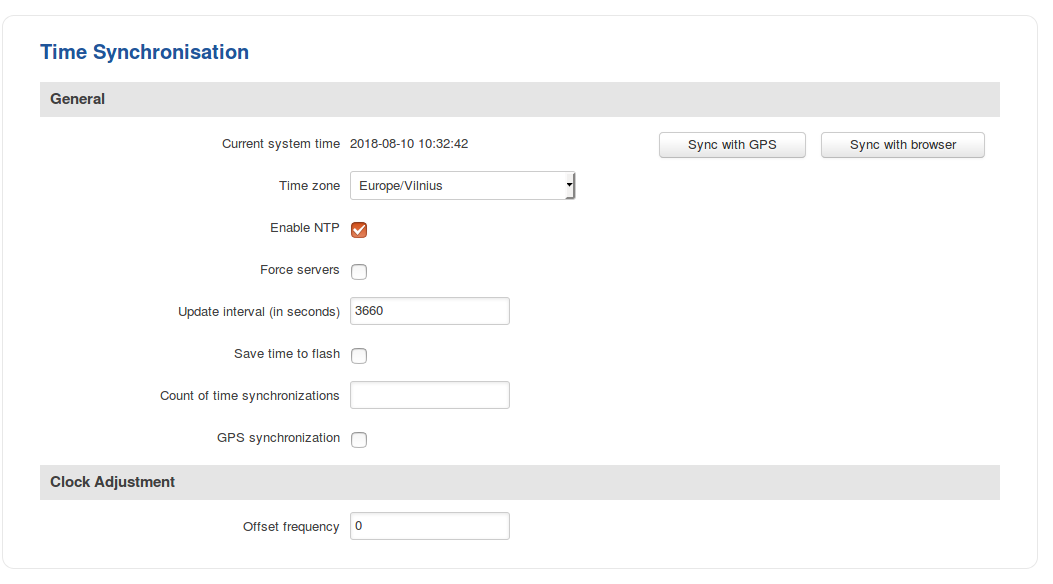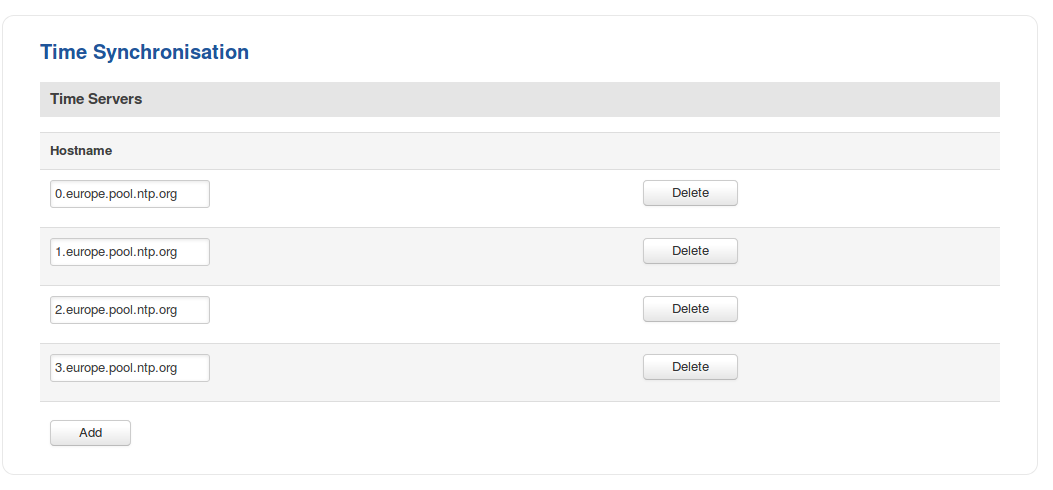RUT230 NTP: Difference between revisions
No edit summary |
|||
| Line 27: | Line 27: | ||
<tr> | <tr> | ||
<td>Enable NTP</td> | <td>Enable NTP</td> | ||
<td>yes | <td>yes | no; Default: '''no'''</td> | ||
<td>SO/IEC 3166 alpha2 country codes as defined in ISO 3166-1 standard</td> | <td>SO/IEC 3166 alpha2 country codes as defined in ISO 3166-1 standard</td> | ||
</tr> | </tr> | ||
<tr> | <tr> | ||
<td>Force servers</td> | <td>Force servers</td> | ||
<td>yes | <td>yes | no; Default: '''yes'''</td> | ||
<td>Forces unreliable NTP servers</td> | <td>Forces unreliable NTP servers</td> | ||
</tr> | </tr> | ||
| Line 42: | Line 42: | ||
<tr> | <tr> | ||
<td>Save time to flash</td> | <td>Save time to flash</td> | ||
<td>yes | <td>yes | no; Default: '''yes'''</td> | ||
<td>Saves last synchronized time to flash memory</td> | <td>Saves last synchronized time to flash memory</td> | ||
</tr> | </tr> | ||
| Line 53: | Line 53: | ||
<tr> | <tr> | ||
<td>GPS synchronization</td> | <td>GPS synchronization</td> | ||
<td>yes | <td>yes | no; Default: '''no'''</td> | ||
<td>Enables periodic time synchronization of the system using the GPS module (does not require internet connection)</td> | <td>Enables periodic time synchronization of the system using the GPS module (does not require internet connection)</td> | ||
</tr> | </tr> | ||
| Line 84: | Line 84: | ||
[[File:Services ntp time servers v2.png]] | [[File:Services ntp time servers v2.png]] | ||
[[Category:RUT230 WebUI]] | |||
Revision as of 08:17, 1 March 2019
Main Page > EOL Products > RUT230 > RUT230 Manual > RUT230 WebUI > RUT230 Services section > RUT230 NTPSummary
Network Time Protocol (NTP) is a networking protocol for clock synchronization between computer systems over packet-switched, variable-latency data networks. This chapter is an overview of the NTP service section of RUTxxx routers.
General
The Time Synchronization section is used to configure general router time settings, like selecting the local time zone, setting a time update interval, synchronizing the time, etc.
| field name | value | description |
|---|---|---|
| Current system time | time; Default: current time | Current local time of the router |
| Time zone | time zone; Default: UTC | Time zone of the country where the router is located |
| Enable NTP | yes | no; Default: no | SO/IEC 3166 alpha2 country codes as defined in ISO 3166-1 standard |
| Force servers | yes | no; Default: yes | Forces unreliable NTP servers |
| Update interval (in seconds) | integer; Default: 3660 | How often the router updates systems time |
| Save time to flash | yes | no; Default: yes | Saves last synchronized time to flash memory |
| Count of time synchronizations | integer; Default: " " | Total amount of times that router will do the synchronization. NOTE: If left blank - the count will be infinite |
| GPS synchronization | yes | no; Default: no | Enables periodic time synchronization of the system using the GPS module (does not require internet connection) |
| Offset frequency | integer; Default: 0 | Adjusts the minor drift of the clock so that it will run more accurately |
| Button: Sync with GPS | - | Synchronizes the router's time with your GPS time |
| Button: Sync with browser | - | Synchronizes the router's time with your browser's time |
NTP Server
The router can also act as an NTP Server, providing clock synchronization to other devices in the network. From this section you can turn this feature ON or OFF.
Time Servers
The Time Servers section displays the time servers that the router uses. You are provided with 4 default time servers (as seen in the example below), but you can also add custom time servers by clicking the "Add" button or you can edit the given time servers.



